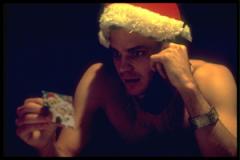Taking a look back at Go, Keith Kuramoto singles out the cast as one of the film’s [big achievements](http://poptimal.com/2011/12/ho-ho-hos-improper-holiday-movies-vol-2/):
> In a movie where every single character has an important speaking role, casting is critical and this film is no exception. It’s an expertly cast movie, where every actor may not be Oscar-caliber, but you believe them in the role and more importantly, they feel right against all the other characters within the mosaic.
Casting director Joseph Middleton had an absurd number of roles to fill and a creative team that was impossible to please — myself included. We spent weeks on casting, seven of us in a room at 8000 Sunset auditioning every young actor with a headshot. We ended up with just the right people, none of whom were stars when we cast them.
Tim Olyphant originally showed up to read for Adam or Zack. By the end of the meeting, he was Todd Gaines, and would be on a new career track.
Katie Holmes had shot the pilot for Dawson’s Creek, but it hadn’t aired yet. Sarah Polley was the timid girl from The Sweet Hereafter. Scott Wolf — well, he was sort of a known deal off of Party of Five. But still — he came in to meet, and it was only after pairing him with Jay Mohr that we offered him the part.
Casting is one area in which the screenwriter tends to have little say, which is a mistake. TV gets it right: the person who wrote the words helps decide who says them.
 Todd Gaines never shot anyone, and had no intention of killing Ronna. He wanted to scare her.
Todd Gaines never shot anyone, and had no intention of killing Ronna. He wanted to scare her.